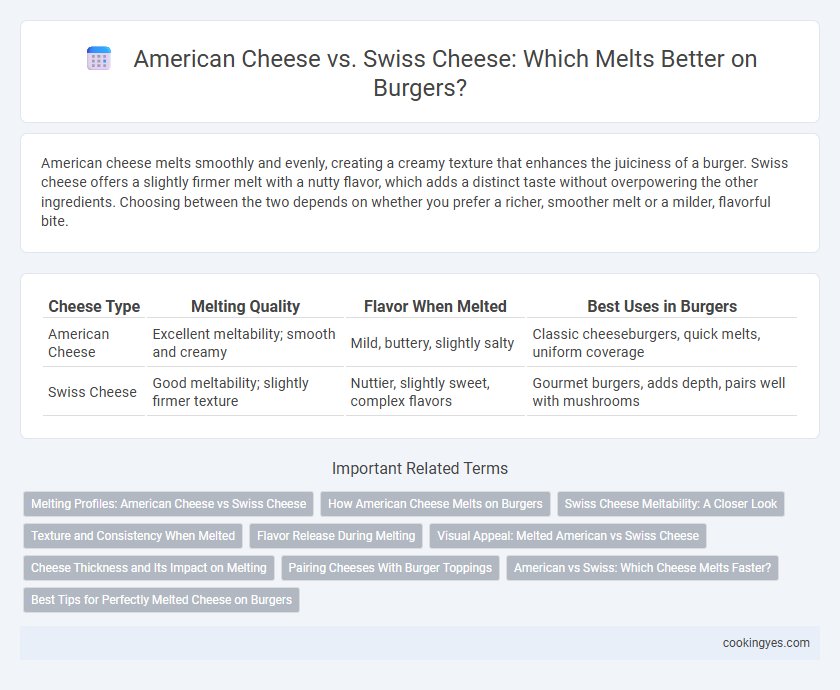American cheese melts smoothly and evenly, creating a creamy texture that enhances the juiciness of a burger. Swiss cheese offers a slightly firmer melt with a nutty flavor, which adds a distinct taste without overpowering the other ingredients. Choosing between the two depends on whether you prefer a richer, smoother melt or a milder, flavorful bite.
Table of Comparison
| Cheese Type | Melting Quality | Flavor When Melted | Best Uses in Burgers |
|---|---|---|---|
| American Cheese | Excellent meltability; smooth and creamy | Mild, buttery, slightly salty | Classic cheeseburgers, quick melts, uniform coverage |
| Swiss Cheese | Good meltability; slightly firmer texture | Nuttier, slightly sweet, complex flavors | Gourmet burgers, adds depth, pairs well with mushrooms |
Melting Profiles: American Cheese vs Swiss Cheese
American cheese exhibits superior melting qualities with a smooth, creamy texture and consistent melt, ideal for burgers that require even cheese coverage and gooeyness. Swiss cheese melts less uniformly, often retaining more structure and creating a firmer, slightly elastic layer that complements burgers seeking a mild, nutty flavor without excessive melt. The moisture and fat content in American cheese result in a more cohesive melt compared to Swiss cheese, which has lower moisture and a denser texture affecting its melting profile.
How American Cheese Melts on Burgers
American cheese melts smoothly and evenly on burgers, creating a creamy, velvety texture that enhances flavor without overpowering the meat. Its high processed milk fat content and emulsifiers allow it to achieve a perfect melt, maintaining a glossy, soft consistency that binds well with the patty. Unlike Swiss cheese, which can become oily or uneven when heated, American cheese provides a consistent, luscious melt ideal for classic cheeseburgers.
Swiss Cheese Meltability: A Closer Look
Swiss cheese exhibits excellent meltability due to its moderate moisture content and high fat levels, creating a smooth, creamy texture when heated. Unlike American cheese, which melts uniformly and quickly because of its processed nature, Swiss cheese offers a slightly firmer melt that holds shape while providing a nutty, rich flavor profile ideal for gourmet burgers. Understanding the difference in melt behavior helps chefs optimize cheese selection for taste and texture in burger preparations.
Texture and Consistency When Melted
American cheese melts smoothly with a creamy, uniform texture that enhances burger juiciness, creating a luscious, gooey consistency. Swiss cheese offers a slightly firmer melt with an elastic stretch, providing a more textured bite while still maintaining good meltability. The choice depends on preferred burger texture: American cheese delivers a soft, velvety melt, while Swiss retains a subtly firmer, yet smooth consistency.
Flavor Release During Melting
American cheese melts smoothly with a creamy texture, releasing a mild, buttery flavor that enhances the overall burger experience. Swiss cheese offers a firmer melt with a slightly nutty and tangy taste that becomes more pronounced as it softens, providing a distinctive flavor profile. Both cheeses deliver unique flavor releases during melting, with American cheese emphasizing creaminess and Swiss emphasizing complexity.
Visual Appeal: Melted American vs Swiss Cheese
Melted American cheese offers a glossy, smooth texture with vibrant orange hues that create an inviting visual appeal on burgers. Swiss cheese melts to a creamy, pale yellow layer with characteristic holes, providing a distinctive, more rustic look. The even melt and bright color of American cheese enhance the burger's presentation, while Swiss offers a unique aesthetic with a slightly firmer texture.
Cheese Thickness and Its Impact on Melting
American cheese melts evenly and quickly due to its processed nature and uniform moisture content, making it ideal for thinner slices that conform well to burger patties. Swiss cheese, with its lower moisture and denser texture, requires slightly thicker slices to achieve a smooth melt without becoming rubbery or separating. Proper cheese thickness directly influences melting quality, as thinner slices of American cheese create a creamy layer, while thicker Swiss slices ensure balanced meltability and flavor retention.
Pairing Cheeses With Burger Toppings
American cheese offers superior meltability with a creamy texture that blends perfectly with classic burger toppings like crispy bacon and sauteed onions. Swiss cheese melts smoothly while providing a nuttier flavor that complements sweeter toppings such as caramelized mushrooms and grilled pineapple. Choosing between American and Swiss cheese depends on the desired balance of melting quality and flavor profile when pairing with savory or sweet burger ingredients.
American vs Swiss: Which Cheese Melts Faster?
American cheese melts faster than Swiss cheese due to its higher moisture and fat content, creating a smooth and creamy texture ideal for burgers. Swiss cheese, with its lower moisture and firmer structure, melts more slowly and retains more shape, providing a nuttier flavor and distinct texture. For a quick, gooey melt on burgers, American cheese is preferred, while Swiss cheese offers a slower, more controlled melt with a richer taste profile.
Best Tips for Perfectly Melted Cheese on Burgers
American cheese melts smoothly and evenly, making it ideal for burgers due to its creamy texture and consistent melt. Swiss cheese offers a nuttier flavor but requires careful temperature control to avoid a rubbery texture during melting. For perfectly melted cheese on burgers, use moderate heat and cover the pan briefly to trap steam, enhancing the melt quality of both American and Swiss varieties.
American cheese vs Swiss cheese for melting quality Infographic

 cookingyes.com
cookingyes.com